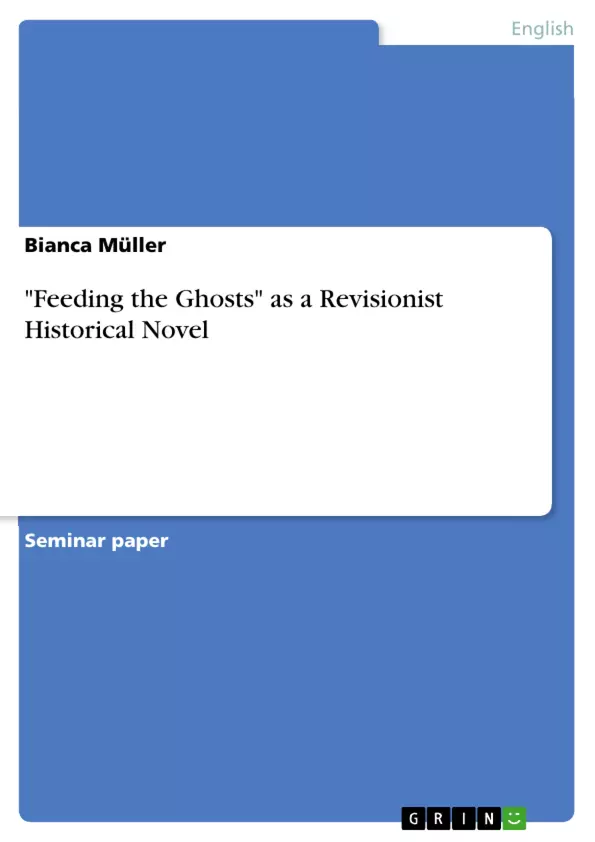Regarding his third novel, Feeding the Ghosts, the British-Guyanese poet, playwright and novelist Fred D’Aguiar states in an interview for the “Caribbean Studies Journal” that “it was a piece of history that then grew out of an absence of facts about it” (Hyppolite). Apparently the author does not intend to convey a coherent, continuous historical account of the infamous ‘Zong-Massacre’, which took place in 1781, but rather the ruins of history in a manner of an “as-if-testimony” (Bröck 29). Thus, the novel belongs to the genre of historical fiction which combines in a postcolonial context imaginative elements and historical facts with regard to the historiographical document of the death of 131 Africans “at the hands of profit-hungry British slave traders and investors on board the slave ship Zong” (Pichler 7).
Sailing from the west coast of Africa to Jamaica, the slave ship carried 442 slaves, more than it could safely transport and was therefore overloaded and lacked sufficient provisions for its ‘cargo’. Together with malnutrition and disease, this overcrowding led to Captain Luke Collingwood’s decision to throw the sick overboard in order to claim money from the insurers, who covered £39 compensation a head, as long as the action was taken to safeguard the ship’s safety. The resulting court trial caused much attention as the case of the Zong outnumbered the known fashion and consequently lead to abolitionist support as the legal status of slaves as ‘cargo’ was confirmed by the concluding verdict. Finally, in 1790 a preliminary bill was passed which ruled out “insurances claims resulting from slave mortality through natural death or ill treatment, or against loss by throwing overboard of slaves on any account whatsoever” (Walvin 20).
Even though “those deaths [...] cannot be undone” (D’Aguiar 230) D’Aguiar succeeds at creating a “counter-memory to Britain’s official memory” (Pichler 1) by recreating this traumatic incident in the history of the Middle Passage and the subsequent trial from the perspective of his heroine Mintah, a Fetu slave woman.
Inhaltsverzeichnis (Table of Contents)
- Introduction
- The Revisionist Historical Novel
- Selection Structures and Dominant References Areas
- Narrative Levels
- Time Reference
- Relation between Fictional History and Knowledge of Historiography
- Types of Illusion and Potential Functions of the Revisionist Historical Novel
- Conclusion
Zielsetzung und Themenschwerpunkte (Objectives and Key Themes)
The essay examines Fred D’Aguiar’s novel Feeding the Ghosts, which revisits the infamous Zong massacre of 1781. It aims to determine if the novel fulfills the criteria of a revisionist historical novel, focusing on the author's use of history and fiction to create a counter-narrative to the official record of the event.
- Revisionist historical novels and their formal criteria
- The representation of slavery in postcolonial literature
- The use of history and fiction in D’Aguiar’s novel
- The role of memory and counter-memory in historical narratives
- The impact of the Zong massacre on historical consciousness
Zusammenfassung der Kapitel (Chapter Summaries)
The introduction presents D’Aguiar's novel as a revisionist historical novel, contextualizing it within the genre of historical fiction and the broader debate about the representation of slavery in literature. It introduces the historical background of the Zong massacre and D’Aguiar's intention to create a "counter-memory" to the official British account of the event. The essay then outlines the criteria used to identify a revisionist historical novel, drawing on the work of Ansgar Nünning.
The second chapter delves into the characteristics of the revisionist historical novel, exploring concepts such as selection structures, dominant reference areas, and the role of heteroreferential and autoreferential elements. The chapter examines how D’Aguiar's use of history and fiction contributes to the novel's revisionist approach, particularly his focus on the perspective of Mintah, a Fetu slave woman.
Schlüsselwörter (Keywords)
The essay explores the keywords of revisionist historical novel, postcolonial literature, the Zong massacre, counter-memory, slavery, and historical consciousness. It analyzes how these concepts interweave within D’Aguiar’s Feeding the Ghosts, exploring the novel’s engagement with the historical record and the power of fiction to challenge dominant narratives.
Frequently Asked Questions
What is the historical basis of the novel "Feeding the Ghosts"?
The novel is based on the infamous 'Zong Massacre' of 1781, where 131 Africans were thrown overboard a British slave ship so the owners could claim insurance money.
Why is "Feeding the Ghosts" considered a revisionist historical novel?
It is revisionist because it creates a "counter-memory" to official British history, telling the story from the perspective of a slave woman, Mintah, rather than relying solely on official documents.
Who is the protagonist of the novel?
The protagonist is Mintah, a Fetu slave woman who survives being thrown overboard and becomes a witness to the atrocities committed on the ship.
What was the legal significance of the Zong trial?
The trial initially confirmed the legal status of slaves as 'cargo'. However, the horror of the case fueled the abolitionist movement and led to laws restricting slave insurance claims by 1790.
How does Fred D’Aguiar blend fact and fiction?
D’Aguiar uses the "absence of facts" in historiography to fill gaps with imaginative elements, creating an "as-if-testimony" that explores the emotional and human truth of the massacre.
What are the formal criteria for a revisionist historical novel used in this analysis?
The analysis uses criteria such as selection structures, narrative levels, time references, and the relationship between fictional history and known historiography to categorize the work.
- Quote paper
- Bianca Müller (Author), 2010, "Feeding the Ghosts" as a Revisionist Historical Novel, Munich, GRIN Verlag, https://www.grin.com/document/169027



